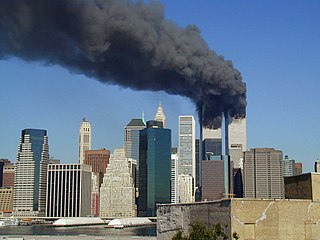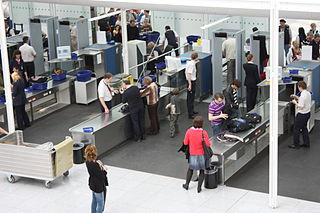
United Nations Security Council Resolution 1373, adopted unanimously on 28 September 2001, is a counter-terrorism measure passed following the 11 September terrorist attacks on the United States. The resolution was adopted under Chapter VII of the United Nations Charter, and is therefore binding on all UN member states.

United Nations Security Council resolution 1566, adopted unanimously on 8 October 2004, after reaffirming resolutions 1267 (1999), 1373 (2001) and 1540 (2004), the Council condemned terrorism as a serious threat to peace and strengthened anti-terrorism legislation.

United Nations Security Council resolution 1267 was adopted unanimously on 15 October 1999. After recalling resolutions 1189 (1998), 1193 (1998) and 1214 (1998) on the situation in Afghanistan, the Council designated Osama bin Laden and associates as terrorists and established a sanctions regime to cover individuals and entities associated with Al-Qaida, Osama bin Laden and/or the Taliban wherever located.
The Al-Qaida Sanctions Committee was established on 15 October 1999, pursuant to UN Security Council Resolution 1267. Initially dealing with both al-Qaeda and the Taliban, hence previously known as the Al-Qaida and Taliban Sanctions Committee, it was split on 17 June 2011, creating the new Taliban Sanctions Committee to separately deal with the Taliban.
United Nations Security Council Resolution 1904, adopted unanimously on December 17, 2009, after reiterating its "unequivocal condemnation" of Osama bin Laden, the Taliban and Al-Qaeda for "ongoing and multiple criminal terrorist acts", the Council adopted new measures to its decade-old regime of sanctions on the groups and others associated with them. The decision to adopt new measures originated from questions arising since Resolution 1267 (1999) and subsequent resolutions which imposed travel restrictions, asset freezes and an arms embargo on Osama bin Laden, the Taliban, Al-Qaeda and other associated groups which were placed on a "Consolidated List" compiled by the Security Council Committee established by Resolution 1267.

United Nations Security Council resolution 1333, adopted on 19 December 2000, after recalling all resolutions on the situation in Afghanistan, including Resolution 1267 (1999), called for a ban of military assistance to the Taliban, closure of its camps and an end to the provision of sanctuary of the movement.

United Nations Security Council resolution 1363, adopted unanimously on 30 July 2001, after reaffirming all resolutions on the situation in Afghanistan, including resolutions 1267 (1999) and 1333 (2000), the Council requested the Secretary-General to establish a mechanism to monitor the implementation of sanctions against the Taliban.
United Nations Security Council resolution 1390, adopted unanimously on 16 January 2002, after recalling resolutions 1267 (1999), 1333 (2000), 1363 (2001), 1368 (2001), 1373 (2001) 1378 (2001) and 1383 (2001) concerning the situation in Afghanistan and terrorism, the Council imposed further sanctions on Osama bin Laden, Al-Qaeda, the Taliban and others associated with them.

United Nations Security Council resolution 1452, adopted unanimously on 20 December 2002, after recalling resolutions 1267 (1999), 1333 (2000), 1363 (2001), 1368 (2001) and 1390 (2001) concerning Al-Qaeda, the Taliban and terrorism, the Council decided that financial sanctions against the organisations would not apply to expenses for food, rent, medicine and medical care, health insurance and professional fees.

United Nations Security Council resolution 1455, adopted unanimously on 17 January 2003, after recalling resolutions 1267 (1999), 1333 (2000), 1363 (2001), 1373 (2001), 1390 (2001) and 1452 (2002) concerning Al-Qaeda, the Taliban and terrorism, the Council improved the implementation of measures against the groups. It was the first Security Council resolution adopted in 2003.
United Nations Security Council resolution 1456, adopted unanimously on 20 January 2003 in a meeting at the foreign minister level, the Council adopted a declaration calling on all states to prevent and suppress all support for terrorism. The resolution did not define terrorism, but unlike other previous resolutions, mentioned human rights for the first time.
United Nations Security Council resolution 1526, adopted unanimously on 30 January 2004, after recalling resolutions 1267 (1999), 1333 (2000), 1363 (2001), 1373 (2001), 1390 (2001), 1452 (2002) and 1455 (2003) concerning terrorism, the Council tightened sanctions against Al-Qaeda, the Taliban, Osama bin Laden and associated individuals and groups.

United Nations Security Council resolution 1617, adopted unanimously on 29 July 2005, after recalling resolutions 1267 (1999), 1333 (2000), 1363 (2001), 1373 (2001), 1390 (2001), 1452 (2002), 1455 (2003), 1526 (2004) and 1566 (2004) concerning terrorism, the Council renewed sanctions against Al-Qaeda, the Taliban, Osama bin Laden and associated individuals and groups for a further seventeen months.

United Nations Security Council resolution 1624, adopted unanimously at the 2005 World Summit on 14 September 2005, after reaffirming previous resolutions on terrorism, including resolutions 1267 (1999), 1373 (2001), 1535 (2004), 1540 (2004), 1566 (2004) and 1617 (2005), the Council called on all states to co-operate in order to strengthen the security of their international borders by enhancing terrorist screening and passenger security procedures.

United Nations Security Council Resolution 1662, adopted unanimously on March 23, 2006, after reaffirming all resolutions on the situation in Afghanistan, including resolutions 1589 (2005) and 1659 (2006), the Council extended the mandate of the United Nations Assistance Mission in Afghanistan (UNAMA) for an additional period of twelve months.

United Nations Security Council Resolution 1988, adopted unanimously on June 17, 2011, after recalling resolutions 1267 (1999), 1333 (2000), 1363 (2001), 1373 (2001), 1390 (2002), 1452 (2002), 1455 (2003), 1526 (2004), 1566 (2004), 1617 (2005), 1624 (2005), 1699 (2006), 1730 (2006), 1735 (2006), 1822 (2008) and 1904 (2009) on terrorism and the threat to Afghanistan, the Council imposed separate sanctions regimes on Al-Qaeda and the Taliban.

United Nations Security Council Resolution 1989, adopted unanimously on June 17, 2011, after recalling resolutions 1267 (1999), 1333 (2000), 1363 (2001), 1373 (2001), 1390 (2002), 1452 (2002), 1455 (2003), 1526 (2004), 1566 (2004), 1617 (2005), 1624 (2005), 1699 (2006), 1730 (2006), 1735 (2006), 1822 (2008), 1904 (2009) and 1988 (2011) on terrorism and the threat to Afghanistan, the Council imposed separate sanctions regimes on Al-Qaeda and the Taliban.

United Nations Security Council Resolution 1699, adopted unanimously on August 8, 2006, after recalling Resolution 1617 (2005) on co-operation between Interpol and the Committee established in Resolution 1267 (1999), the Council requested the Secretary-General to take steps to increase co-operation between the United Nations and Interpol.

UN sanctions against the Taliban-controlled government of Afghanistan were enforced in November 1999. The sanctions were aimed at terrorists, Osama Bin Laden and members of Al-Qaida.

United Nations Security Council Resolution 2253 was prepared by the United States and Russia and was unanimously adopted by the UN Security Council on 17 December 2015. The resolution specified that the sanctions that were already in force against Al Qaeda would also focus on the Islamic State in Iraq and to (ISIL/Da’esh). This resolution summed up the criteria according to which persons and organizations could end up on the sanctions list. Countries were also asked to take stricter action to cut off the financing of terrorist groups.














